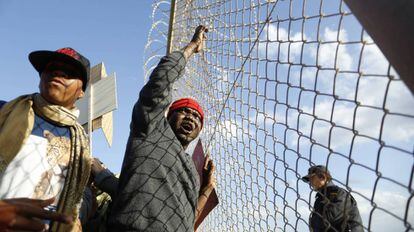The lucrative business of securing Europe’s borders
Private companies are playing an increasingly important role in preventing immigrants from entering the EU


If you are thinking of investing in a business, don’t rule out the border control industry. Europe spent €17 billion on stopping immigration from 2014 to 2016 according to a report by the British think-tank Overseas Development Institute (ODI).
For ODI managing director Marta Foresti the principal change in strategy to arise from the immigration crisis of 2015, when a million would-be refugees entered Europe, is an economic one.
“[This is true] in terms of surveillance and the creation of border fences and in terms of aid to countries of origin,” specifies Foresti, noting, as a case in point, that the budget of the European Union border agency Frontex has skyrocketed from just €6 million in 2005 to €254 million in 2017.
The global border security industry is predicted to be worth €50 billion in 2022
Theodore Baird, researcher at the University of Amsterdam has noted in one of his articles that the control of European borders has become more restrictive, militarized and “deadly” since the 1990s.
“To support this restrictive regime, a European market has grown up driven by a number of companies that participate in the design, production and supply of security technologies and border surveillance.”
Corporate giants such as Ericsson, Airbus, German conglomerate Siemens, Italy’s Leonardo S.p.A. (formerly Finmeccanica), and British firm G4S, as well as Spain’s Indra and Thales don’t just provide tools and offer services to European Union states and agencies. They also participate as experts in the drawing up of EU reports on the future of the security industry. The Security for Sale investigation carried out by 22 European journalists in 11 countries notes security companies make €30 billion per year in the EU with Indra and Airbus among the top 10 recipients of European security funds.
“There are different forms of privatization in terms of migration material, and obviously outsourcing is linked with budgetary concerns,” says Yves Pascoau, Director of Migration and Mobility Policies at the European Policy Centre, a Brussels-based think-tank.

“In France, for example, private firms have taken over visa processing as they [the companies] are faster in collecting applications and this streamlines the process,” Pascoau says via telephone.
Subcontracting and outsourcing are common practices in the business world but there are serious issues when it comes to applying these methods to immigration. Angolan citizen Jimmy Mubenga died in 2010 when security agents with private firm G4S wrestled him to the ground after he protested while boarding a British Airways flight during deportation proceedings.
That tragic episode, told by France’s Claire Rodier in her 2013 book Xénophobie Business exemplifies the dilemma of privatizing immigration services. The cause of death of Mubenga, who, according to witnesses, suffocated, was never established by authorities.
G4S subsequently lost their security contract but no one was disciplined and work practices were not changed. Another company took on the unpleasant but lucrative role.
In Spain, Air Europa last year lost a contract which saw it repatriating undocumented migrants in what were dubbed “flights of shame.” Evelop Airlines, Orbest, and Air Nostrum went on to bid to become the providers of the service which also includes providing transfers of those migrants within Spain, and will be worth €11 million over 18 months.
Do we really want to help ensure that people don’t leave a country where there are refugees and even slaves? Cristina Gortázar, Comillas Pontifical University
Spain “has inspired” some of the key pillars of the EU’s security procedures including the building of walls and the installation of intelligent surveillance systems, according to Virginia Rodríguez, a researcher with the Spanish foundation PorCausa that carries out research on migration and poverty issues.
The walls that separate Spain’s North African exclaves of Ceuta and Melilla from Morocco – which cost €72 million from 2005 to 2013 according to Amnesty International – along with Spain’s coastal surveillance system SIVE – which had a cost of €230 million from 2000 to 2008 – are the clearest examples of this. Firms including Spanish companies Indra and Dragados are behind these projects.
The ODI report mentions that since the fall of the Berlin Wall in 1989, a total of 1,200 kilometers of border fence have been constructed in Europe. The estimated total cost of seven of these – those built in Greece, Bulgaria, Hungary, Austria, Slovenia, Latvia, and Estonia from 2011 to 2016 – is €300 million. In 2013, the EU installed a system similar to SIVE to provide surveillance of its frontiers using drones, sensors and satellites. A further €244 million is slated to be spent on the project up to 2020.
In addition, in 2003, Spanish firm European Security Fencing patented the concertina wire used on the border fence separating the country’s North African exclave of Melilla from neighboring Morocco. That product is now also used on the Serbia–Hungary border.
According to estimates cited by Baird, the global border security industry will be worth €50 billion in 2022 but he warns the figure is deceptive. There is no official accounting as to how much migration control costs, and it is not clear which activities are covered by the sector and which are not.
“There is very little transparency,” confirms Foresti.
Outsourcing the EU’s borders
Contracting out immigration services also means moving the border to third countries. Spain has injected €168 million into the economies of the West African countries of Senegal and Mauritania since 2006 to halt the arrival of boats carrying undocumented migrants to the Canary Islands. Recently the EU signed a deal with Nigeria, Niger, Senegal, Mali, and Ethiopia with a single objective: reducing the flow of migrants. The failed state of Libya has also received a €130-million slice of the pie.
Mattia Toaldo, a senior policy fellow with the European Council on Foreign Relations, explains that there are “solutions” that can function in Libya, such as the EU Border Assistance Mission in Libya – a €20 million initiative aimed at restructuring police and border security forces in the country. “But it will take years before these measures take effect and only if everything goes well,” says Toaldo.
"People smugglers are facing increasing demand because the legal immigration channels toward Europe are often closed or difficult to navigate," he adds.
One clear example of this problem is the millions of refugees stranded in Turkey, a country that has received €3 billion in exchanged for shutting down the route for migrants into Europe. “This deal has paved the way for the adoption of made-to-measure migration compacts,” says Cristina Gortázar, lecturer in law at Spain’s Comillas Pontifical University.
“The next [compact] will be with Libya. But do we really want to help ensure that people don’t leave a country where there are refugees and even slaves? We are buying borders and selling human rights, but as long as there are violent conflicts and as long as there is a lack of social development, forced migration will continue,” Gortázar notes.
This story is part of a project called The New Arrivals, funded by the European Journalism Centre with support from the Bill & Melinda Gates foundation, in which EL PAÍS is a participating member together with The Guardian, Der Spiegel and Le Monde.
English version by George Mills.

